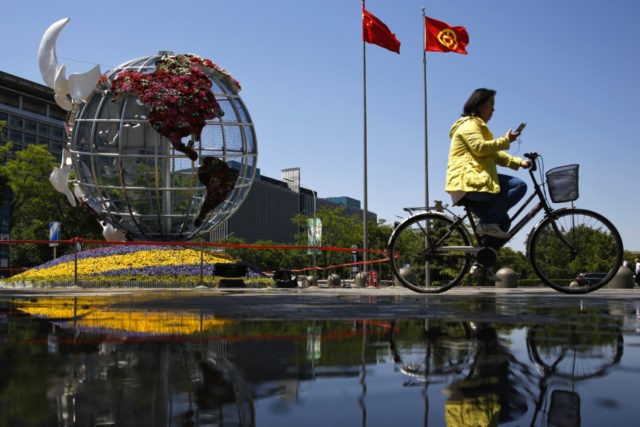Steven Mosher: China Loses Money on Everything But Exports, Trump’s Tariffs Will Break Them

5:13
Applying tariffs to Chinese exports is “the key to bringing China to heel,” determined Steven Mosher, expert on China and author of Bully of Asia: Why China’s Dream is the New Threat to World Order, offering his remarks on Friday’s edition of SiriusXM’s Breitbart News Tonight with host Rebecca Mansour and special guest host Rick Manning.
Mosher likened China’s political elite to Russian oligarchs who acquired ownership of state assets following the collapse of the Soviet Union.
“We hear a lot about the wealthy Russians, the oligarchs in Russia who took over all the state-owned enterprises when the Soviet Union collapsed,” said Mosher. “Well, China didn’t collapse. The People’s Republic of China still exists, but we have the same kind of class of oligarchs who are politically-connected, who are economically enormously wealthy, including the family of Xi Xinping himself.”
LISTEN:
Mosher continued, “These people are worth billions. It’s all ill-gotten gains, for goodness sake, because their official salaries are a few thousand dollars a month. How can you wind up after a few decades in office with a fortune of billions except by taking lots of money on the side?”
Exports are the lifeblood of China’s economy, stated Mosher, highlighting the inefficiency and corruption endemic to centrally-planned economies.
“The tariffs have hurt the export sector of economy tremendously in China, and remember, that’s the only sector of the economy that actually makes money, the rest of the economy loses money,” Mosher remarked. “The state-owned enterprises [are] these huge dinosaurs run by huge non-productive bureaucracies consisting of Communist Party officials who have no idea how a market economy works and are just there to take bribes, make deals, and pocket the profits.”
Chinese exports to the U.S. and broader West buoy China’s otherwise weak economy, assessed Mosher.
“The state-owned enterprises are all losing money,” Mosher said. “The state-owned steel mills, the state-owned railroads, they’re all in huge amounts of debt, and of course the government keeps funding them, and the money comes from what? The money comes from what is stolen from the West and from the United States. It comes from the export sector of the economy and the trade surplus that President Trump is trying so manfully to reduce, now. That’s the key to bringing China to heel. If you can cause enough pain to the export sector of the Chinese economy, it ripples throughout China, it hurts the political class, it hurts the economy in general, and it will eventually bring them around.”
Conflict between the Chinese and American vision of a global order is the “twilight struggle” of the 21st century, estimated Mosher.
Mosher said, “If we can stay the course, if we can continue to be strong in the face of the Chinese tariff war, the Chinese theft of intellectual property, and the other provocations that are almost constant, now, then we can win, what is, I think, the second great twilight struggle that we’ve had to face. The first, of course, was the long-running decades-long confrontation with the Soviet Union that we won, and the second is this long-running confrontation with the People’s Republic of China, and I think if we continue current policies of the current administration, we will win here, too.”
The Chinese people have achieved successes despite China’s authoritarian political system, noted Mosher.
“I think if you were to go to China, you would find a lot of people, perhaps very quietly, coming up to you and saying very positive things about the United States, and about democracy and human rights,” speculated Mosher. “There is an undercurrent in China of respect for what America has been able to accomplish. Remember, many Chinese have come to the United States and gone to other parts of the world, [and] they’ve succeeded wherever they’ve gone. Chinese-Americans have one of the highest average incomes of any group in the United States.”
Mosher went on, “The Chinese have succeeded in Hong Kong in turning a barren island — which in 1840 had a population of 2,000 people living in two fishing villages — into a modern metropolis financial center with 7.3 million people. Another island, Singapore, has been turned into a financial hub and a modern democracy. … Taiwan is a thriving democracy, a first world country with respect for human rights and a wonderful standard of living. So the Chinese have succeeded everywhere they’ve gone in the world, except in China, where they’re being held back by a 19th century political party which is more interested in producing tyranny, ultimately, than in producing the goods or allowing the Chinese people to rule themselves.”
Mosher concluded, “Certainly, I have great respect for the Chinese people, who are among the hardest working, most enterprising, and most intelligent people the world has ever seen. It’s a great tragedy that they’re languishing under one of the most tyrannical surveillance states the world has ever seen.”

No comments:
Post a Comment